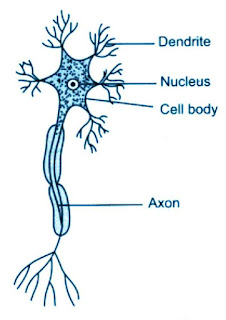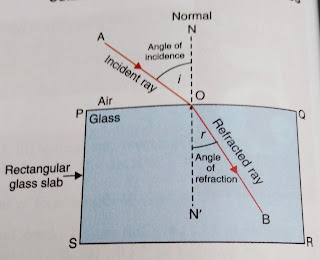Matter In Our Surroundings (Solution of NCERT In Text Questions - part-2)
Matter In Our Surroundings
Solution of NCERT In Text Questions - part-2
Question No:
– 7
(a) A gas
fills completely the vessel in which it is kept. Explain on the basis of
molecular theory.
Answer: There
is negligible intermolecular force between particles of gas. As a result,
particles of gas move in all directions. Hence, gas particles fill the vessel
completely in which it is kept.
(b) A gas
exerts pressure on the walls of the container. Explain on the basis of
molecular theory.
Answer – The
kinetic energy of the molecules of gases is maximum as there is negligible
intermolecular force between the molecules. So they move about randomly at a
high speed. These randomly moving high speed molecules hit against the sides of
the containing vessel. As a result a gas exerts pressure on the walls of the
vessel in which it is kept.
(c) A wooden table should be called a solid. Why?
Answer: -
This is because a wooden table has fixed shaped and fixed volume.
(d) We can easily move our hand in air but to
do the same through a solid block of wood we need a karate expert. Explain on
the basis of molecular theory.
Answer: -
The intermolecular force of attraction between the molecules of air (gas) is
negligible and the molecules are loosely packed. So, we can easily move our
hand in air
But the
intermolecular force between the molecules of wooden block (solid) is very high
and the molecules are tightly packed. So, we cannot move our hand through
wooden block. However a
karate expert can exert required pressure to break the great force of
attraction of the particles of a solid wooden block.
Question
No: – 8 – Why ice can float on water in spite of those liquids have lower
density than solids?
Answer: Ice
float on water because ice has lower density than water. When water freeze,
some space between the particles of water is left vacant with some air trapped
between them. These empty spaces having air in them makes the density of ice.
Question No:
– 9 - Convert the following temperature to Celsius scale.
(a)373 K
(b) 500 K
Answer :-
(a) Temperature on Kelvin scale = Temperature on Celsius scale + 273
Therefore,
Temperature
on Celsius scale = Temperature of Kelvin scale – 273
Hence,
Temperature on Celsius scale = 373K – 273 = 100⁰C
Answer
(b) Temperature on Kelvin scale = Temperature on Celsius scale + 273
Therefore,
Temperature on Celsius scale = Temperature of Kelvin scale – 273
Hence,
Temperature on Celsius scale = 500K – 273 = 227⁰C
Question
: – 10 – In which state water will exist at : (i) -2°c (ii) 50°c (iii) 102°c
Answer: (i)
Solid (ice). (ii) Liquid (water) (iii) gas (water vapour)
Question
: – 11 – Why does the temperature remain constant when a solid starts melting?
Answer: The
heat energy supplied during melting, does not increase the average kinetic
energy of the molecules, as the average kinetic energy of the molecules is the
measure of the temperature of a body. Instead, the heat energy supplied
increases the intermolecular spaces, which in turn weakens the intermolecular
forces. Hence, solid changing into the liquid state.
Question
No: 12 - Suggest a method to liquefy atmospheric gas.
Answer – We
can liquefy atmospheric gas at pressure and low temperature.
Question
: – 13 - Why does a desert cooler cool better on a hot dry day but do not cool
well in rainy season?
Answer –
Rate of evaporation increases with lower the humidity. Desert cooler works on
the basis of evaporation. In hot and dry days the moisture level is very low in
atmosphere which increases the rate of evaporation. Since faster evaporation
occur, cooler works well. That’s why desert cooler cool better on a hot dry
day.
But the
desert cooler does not cool well in the rainy season, because the rate of
evaporation falls on account of increased humidity.
Question No:
– 14 – Water keeps cool in an earthen pitchers during summer. Why?
Answer: The
water which kept in earthen pitchers is oozes out of the pores of the earthen
pots and starts evaporating. This evaporation occurs rapidly during summer
because of lower humidity. As cooling caused evaporation, therefore, the
temperature of water within the pitcher falls and hence water becomes cool.
Question No:
– 15 - Why does our palm feel cold when we put some acetone or petrol or
perfume on it?
Answer – As
the acetone or petrol or perfume are volatile liquids, they evaporates rapidly by
absorbing heat from the palm. Thus we feel cool.

